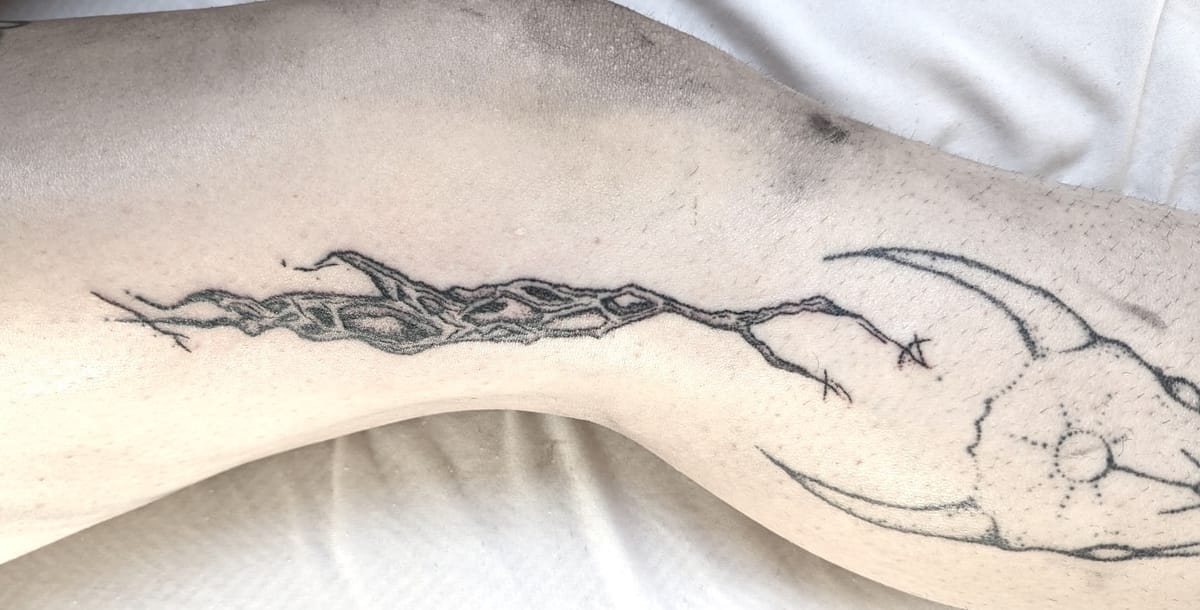Ritual Tattoo: An Offering of Flesh

I obtained my first tattoo at 16: a design I created myself and had inked by someone else, a kind of homage and offering to a deceased friend from childhood. It's funny to me now, because I actually didn't know her that well, and of all the death that's touched my personal circle over the years, this was the only one I honored with a tattoo. I think in some way, experiencing her death was a rite of passage, an initiation into an acknowledgement of mortality, and that's why it struck me the way it did. I spent the next several years getting tattooed quite heavily, yet not always so intentionally, though the reasons existed behind my own psychic censor.
The question of "why would anyone get tattooed?" is one that plagues and galvanizes the work of anthropologists, sociologists, and psychologists the world over. And yet, despite these scientists' supposed temporary "embedding" into indigenous worlds and underground subcultures the true answer is elusive because they are limited by their own gaze, and their seeming determination to reinforce their own codified assumptions on the subject. Yet, this question is a relatively new one: before colonial sea captain James Cook "discovered" tatau practices in Polynesia, the question didn't have to exist. The answer was known by those who needed to know it.
We know the answer, too, though it's become a bit complicated. Even in the early days of tattooing in the West the answer was generally fairly straightforward: sailors obtained tattoos to document their travels, and so their bodies could be identified if lost at sea. Prisoners and members of some early 20th century gangs were tattooed as acts of initiation or to display their achievements, women for whom the "freak show" circuit was a viable option would partner with tattooists for bodysuits of images, and so on. Deeper into the 20th century, tattoos still mostly belonged to those fully initiated into various subcultures, though the list of subcultures that had tattooing cultures had increased, and those who were heavily tattooed still mostly existed on the fringes of society.
Steadily, this changed. Somewhere within the confluence of reality TV influence (and its indication of a curious middle class) and a new generation of artists entering the trade, along with a plethora of other small factors, tattooing became something new. The degree to which tattooing has become purely aesthetic and ultra commercialized is unprecedented in history, though this phenomena is not unique to tattooing. Nearly all forms of body modification (permanent or not) have followed a similar–if not subtler–path: makeup, jewelry, piercings, scarification, body painting, and so on. What was once an honor to wield, wear, or obtain, is now simply another thing to consume or collect. Most tattooists are successful based on their ability to garner a large online following, and clients often wish to collect pieces from the most popular names in tattooing. The body of the tattooed, then, becomes a kind of display case: a kind of accessible art collection for the lower to upper middle classes. Tattooing is, of course, still stigmatized for the lower class, but now the justification for stigmatizing those tattoos is artistic: middle class collectors of tattoos notice when someone's tattoos are cheap or poorly done, when previously (mostly) only tattoo artists made such distinctions or really cared. Where the middle class and the wealthy co-opt that which was once exclusively the art of the marginalized, they change the language and take the art away from those they see as less than themselves, all the while positioning themselves as progressive for having images on their flesh – despite that it is now white collar professions which are more accepting of tattooed employees than blue collar ones (provided that the tattoos are well done, of course).
Now, returning to our question: why would anyone want to get tattooed?
If you have tattoos, you have your own answer, I'm sure. Though this is strange: where tattooing used to be the practice of indigenous peoples or (more recently and relatable to many of us) Western subcultures, there would have been a collective answer rooted in a cultural context with clear meaning. And similar to my critique of spiritual practices that are purely individual and based on theory and praxis that one just creates for themselves, I am critical of utilizing what was once a powerful tool for group cohesion, spiritual transformation, and the recognition of one's role within a community as a luxury product that serves to further reinforce our concept of Self as an island, unique and exempt from broader accountability as a critical member of a community. This is not necessarily to say that commercial tattooing is morally wrong, but that it is likely that it is not helping us to create autonomy as we so often believe it is, but rather it is further reinforcing the ownership of our bodies by an economic system that exploits them. One could argue that in this paradigm, your skin is capital. It is real estate, property: it is the gallery walls. The artists you choose to adorn them are perhaps not the artists you would choose without a social media platform's algorithm preferencing one over the other arbitrarily, and therefore if that is true the choice is not really your own. Something that has the potential to help one to reclaim their ownership of body and their physical and psychological agency now for these reasons contains negative potential.
What would it look like to reclaim this tool for the purpose of reconnecting with one another, with our Self as a critical member of our community, and with the Divine as we seek to recreate practices that liberate us from isolation and oppression? What would the rebuilding of a communal context supporting intentional, ritual tattooing look like?
Many Indigenous peoples are doing just this: but many of us (even my family members with Indigenous blood who are disconnected from membership with their Nation and therefore their closed practices) are outside of such revivals. This should not mean we can not hope to recreate a contextualized and rooted tattoo culture, but it does mean that what we create must be rooted in something more applicable to us.
I have been considering the answer to this question for years now, and sometimes feel hardly closer to a satisfactory answer. In many ways, I wonder if the kind of cult I argue for the creation of in my last post is a necessary prerequisite. Though sometimes I believe that it is possible to create a practice which is more open, and therefore more accessible to those at all levels of spiritual practice and group membership who are ready for an act of transformation.
Accessibility becomes a tricky notion, however. Bringing to a modern person a tattoo rite which is purported to be rooted in ancestral purpose, which has the potential to spiritually and physically transform the recipient, and which has ultimately magickal potential, is a loaded thing to do. First, there must be a radical paradigm shift on the part of both the tattooist and the client. Both must enter into the exchange understanding it, and investing honestly their will and intention into it. This necessitates some critical discipline already on the part of the recipient, and on the part of the practitioner. There is a subset of tattooers hungry to call themselves "ritual" or "ceremonial" tattooers: some more invested than others in the spiritual aspects of their practice, and I think this also speaks to an enormous amount of people starving for meaning, connection, rootedness, and magick in their own lives. This is not a bad thing – I see many of these practitioners as scratching around an itch, getting closer all the while to its center. What's missing, however, is a divestment from the notion that tattoo is a product for an individual. The subculture of ritual tattooing becomes an arm of the New Age, then: a commercial portal for accessing Divinity, on one's own convenient terms.
Of course, I recognize where I am guilty of espousing similarly individualist approaches in my own practice, and it's an ongoing balance of reaching those who genuinely need an entryway into deeper connection with their agency or the Divine and remaining exclusive enough that the people I offer truly powerful tattoos to are, first of all, psychologically and spiritually prepared, and second, intending to utilize the transformation they seek for collective rather than solely individual purposes.
Maybe that seems unnecessarily pretentious, and I would understand that interpretation. However, it is important to remember that my goal is to recreate context around the sacred practice of tattooing, and necessarily then the recipients must also become a part of that context for my intention (or theirs) to mean anything.
Crucially, in order to reclaim tattoo as a tool for human and community sovereignty and connection with one another and the Divine we must pick apart both the concept of tattoo as product and tattoo as solely aesthetic adornment or status accumulation. The first is harder: while to this day I have yet to accept money, actually, for a single tattoo I've done on another human, the economic reality of my life and the ongoing drive to maintain the mission of the Ranch I run makes accepting money tantalizing. Making money from tattooing of this sort feels much more ethical than the alternative of working for a company in some other capacity, and yet it has simply felt wrong each time I've attempted to "brand" my practice and market it as though it were just another product. This dilemma is still unanswered, for me at least, though I hope to continuously evolve and seek answers.
Bringing recipients out of the mindset that tattooing is solely aesthetic adornment or status accumulation is also difficult, albeit somewhat less confronting than altering the way people are used to interacting with a tattooist economically. In general the transition is simply gentler, because the image tattooed is still rooted in the individual's purpose, needs, and guides. So the act of attaining tattoo is similar, it is the mind that must change to recognize that the will we are attempting to manifest is rooted in a context and is interdependent with other wills.
Ultimately, I believe that the reclamation of tattoo is not only possible but necessary, if only for those of us who starve for it. Re-engaging with ancient practice, combining it with the reality of our day-to-day existence in a radical exchange of knowledge through time, and utilizing it as a tool for fostering spiritual awareness, interpersonal bonds, the reigniting of passage rites, of celebratory ritual, and of sovereignty – this is an act with enormous potential. But it may not be seamless. There are levels of engagement, of teaching and learning, and of willingness to fully shift from the paradigm of satiating the need for status and self-isolation through political identity. Perhaps any reclamation must be individual, at first, an exploration of our own boundaries. And then, I hope it blossoms and spreads and becomes easier through the recreation of a new context and language of magick embedding into skin.
If you find these musings useful or interesting, please consider sharing with a friend.
Until next time ~
